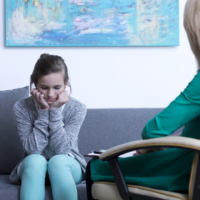Cognitive Behavioural Therapy (CBT)
-

A day in the life of a Children’s Wellbeing Practitioner
CWPs deliver low-intensity psychological interventions for mild to moderate low mood and anxiety disorders.
Read more -

Family group cognitive behavioural therapy reduces youth internalising problems
Living with a parent with depression can have a marked impact on a child’s overall psychological, behavioural and social welfare. Preventative programs that alter parenting and boost children’s coping strategies in affected families seem to reduce youth internalizing problems, but the broader effects of these programs are unclear.
Read more -

Prescribing in the dark: off-label drug treatments for children with insomnia
Insomnia is a common problem in children with neurodevelopmental disabilities (NDDs), and has a profound effect on quality-of-life.
Read more -

Parent-led group CBT training can reduce anxiety in children
A brief psychological intervention in which parents and carers are supported in applying cognitive behavioural therapy (CBT) principles in their child’s day-to-day life can lead to good outcomes for child anxiety disorders, according to new research.
Read more -

Meta-analysis of secondary anxiety prevention
Dr Peter Lawrence summarises the paper ‘Prevention of anxiety among at-risk children and adolescents – a systematic review and meta-analysis’
Read more -

Children with a Specific Phobia do better in Individual CBT than Group CBT and guided parent-led CBT
Children often present to health care settings with highly impairing and disabling anxiety disorders, including Specific Phobia, Social Anxiety Disorder, Generalised Anxiety Disorder and Separation Anxiety Disorder.
Read more -

Effects of development must be considered when examining interpretation bias in children with anxiety
Anxiety is often treated using interventions that target interpretation bias, but the link between interpretation bias and anxiety in children is unclear. Now, in a Research Review published in the Journal of Child Psychology and Psychiatry, Suzannah Stuijfzand and colleagues have performed a meta-analysis of the literature to establish whether this association in children really does exist.
Read more -

Psychosocial interventions for disruptive behaviour problems are feasible in low and middle-income countries
Erly 2018, JCPP published data from a systematic review and meta-analysis of psychosocial interventions for disruptive behaviour problems in children in low and middle-income countries. The study, by Professor Matthew Burkey and colleagues, found that child-focused and behavioural parenting interventions may be effective for affected children in these socioeconomic groups.
Read more -

The overlap between low self-esteem and anxiety/depression in CAMHS
Our systematic review aimed to establish what is known about low self-esteem and anxiety/depression in young people (<18s). We wanted to find out whether young people with clinically significant anxiety disorders and/or depression also have low self-esteem as measured on validated questionnaires. We also wanted to know whether young people with low self-esteem as measured on a validated questionnaire develop depression and anxiety symptomology later in adolescence and young adulthood.
Read more -

Determining the “IMPACT” of therapeutics for depression requires an adaptive trial design
A large proportion of adolescents suffering from moderate-to-severe major depression respond to psychological and pharmacological therapy, and the range of effective treatment modalities is increasing. Now, Ian Goodyer and Paul Wilkinson have compiled a Practitioner Review that compares the various treatment options available and assesses their effectiveness for adolescents affected by major depressive episodes.
Read more